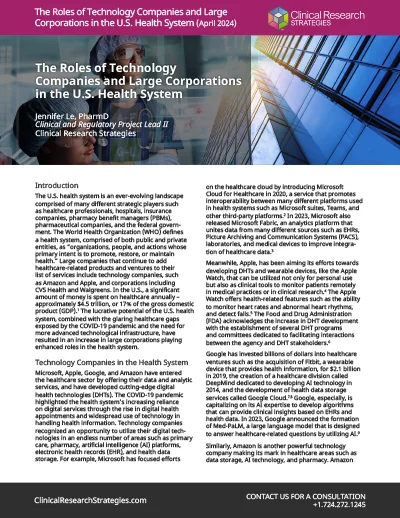THE ROLES OF TECHNOLOGY COMPANIES
AND LARGE CORPORATIONS IN THE U.S. HEALTH SYSTEM
The Roles of Technology Companies and Large Corporations in the U.S. Health System
Jennifer Le, PharmD
Clinical and Regulatory Project Lead II, Clinical Research Strategies
April 2024
The U.S. health system is an ever-evolving landscape comprised of many different strategic players such as healthcare professionals, hospitals, insurance companies, pharmacy benefit managers (PBMs), pharmaceutical companies, and the federal government. The World Health Organization (WHO) defines a health system, comprised of both public and private entities, as “organizations, people, and actions whose primary intent is to promote, restore, or maintain health.” Large companies that continue to add healthcare-related products and ventures to their list of services include technology companies, such as Amazon and Apple, and corporations including CVS Health and Walgreens. In the U.S., a significant amount of money is spent on healthcare annually – approximately $4.5 trillion, or 17% of the gross domestic product (GDP).(1) The lucrative potential of the U.S. health system, combined with the glaring healthcare gaps exposed by the COVID-19 pandemic and the need for more advanced technological infrastructure, have resulted in an increase in large corporations playing enhanced roles in the health system.
Technology Companies in the Health System
Microsoft, Apple, Google, and Amazon have entered the healthcare sector by offering their data and analytic services, and have developed cutting-edge digital health technologies (DHTs). The COVID-19 pandemic highlighted the health system’s increasing reliance on digital services through the rise in digital health appointments and widespread use of technology in handling health information. Technology companies recognized an opportunity to utilize their digital technologies in an endless number of areas such as primary care, pharmacy, artificial intelligence (AI) platforms, electronic health records (EHR), and health data storage. For example, Microsoft has focused efforts on the healthcare cloud by introducing Microsoft Cloud for Healthcare in 2020, a service that promotes interoperability between many different platforms used in health systems such as Microsoft suites, Teams, and other third-party platforms.(2) In 2023, Microsoft also released Microsoft Fabric, an analytics platform that unites data from many different sources such as EHRs, Picture Archiving and Communication Systems (PACS), laboratories, and medical devices to improve integration of healthcare data.(3)
Meanwhile, Apple, has been aiming its efforts towards developing DHTs and wearable devices, like the Apple Watch, that can be utilized not only for personal use but also as clinical tools to monitor patients remotely in medical practices or in clinical research.(4) The Apple Watch offers health-related features such as the ability to monitor heart rates and abnormal heart rhythms, and detect falls.(5) The Food and Drug Administration (FDA) acknowledges the increase in DHT development with the establishment of several DHT programs and committees dedicated to facilitating interactions between the agency and DHT stakeholders.(6)
Google has invested billions of dollars into healthcare ventures such as the acquisition of Fitbit, a wearable device that provides health information, for $2.1 billion in 2019, the creation of a healthcare division called DeepMind dedicated to developing AI technology in 2014, and the development of health data storage services called Google Cloud.(7,8) Google, especially, is capitalizing on its AI expertise to develop algorithms that can provide clinical insights based on EHRs and health data. In 2023, Google announced the formation of Med-PaLM, a large language model that is designed to answer healthcare-related questions by utilizing AI.(9)
Similarly, Amazon is another powerful technology company making its mark in healthcare areas such as data storage, AI technology, and pharmacy. Amazon Web Services (AWS) is one of the world’s leading cloud services that plays a significant role in healthcare digitization and is frequently expanding its services. In 2023, Amazon rolled out AWS HealthScribe, a program that utilizes AI and speech recognition technology to assist clinicians with clinical documentation during patient visits.(10) In the pharmacy realm, Amazon has expanded its influence with the acquisition of PillPack, an online pharmacy service for $750 million, as well as the launch of Amazon Pharmacy in 2020. Amazon’s foray into pharmacy creates competition to existing large retail pharmacy chains and PBMs.(11) Over the last several years, technology companies have rapidly increased their presence in the healthcare field through their innovative technologies and data services. By offering data infrastructure services to providers and hospital systems, many technology companies have gained access to health data from many different healthcare facilities. The technology companies utilize AI technology and algorithms to provide insights into healthcare data as well as develop DHT and medical products.
Large Corporations in the Health System
In addition to technology companies staking their claims in the healthcare industry, other large corporate entities are pursuing opportunities in the health system by securing health insurance companies, primary care practices, and organizations that provide medical services. Medicare, the federal health insurance for Americans aged 65 years or older, has experienced increasing privatization over the years. More than half of the Center of Medicare and Medicaid’s (CMS) 60 million beneficiaries are covered under the Medicare Advantage Program, a branch of Medicare in which the federal government pays insurance companies approximately $400 billion annually to provide benefits.(12,13) Large corporations have taken notice of the significant monetary potential in providing healthcare insurance as well as the opportunity to expand access to medical services across the country.
CVS Health, Amazon, Walgreens, and UnitedHealth have conducted multi-billion-dollar purchases of various health insurance and primary care provider (PCP) organizations over the past decades. CVS Health is an enormous corporation that leverages health insurance, retail and specialty pharmacies, and urgent care services. In 2007, CVS Health acquired Caremark, the country’s leading PBM organization, which gave CVS Health greater influence over drug prices and the insurance coverage of millions of patients.(14) In 2018, CVS Health purchased Aetna, a major health insurer, in a $69 billion purchase that marked the biggest healthcare merger in U.S. history and allowed the company to become one of the most powerful players in health insurance.(15) In addition to CVS Health’s expansion of more than 9,000 CVS retail pharmacies across the country, CVS Health established MinuteClinic, a retail clinic that provides specific medical services, across 1,000 locations in the country.(16) The company has made many recent acquisitions that reveal their goal to broaden their provider services such as their $8 billion purchase in 2022 of Signify, a home healthcare company, that added more than 10,000 providers to the CVS Health network of providers.(17) In 2023, the company made a $10.6 billion purchase of Oak Street Health, a primary care organization that treats Medicare Advantage patients. The Oak Street Health acquisition added 170 clinics nationwide to CVS Health’s growing list of clinics.(18)
Similarly to CVS Health, Amazon has made significant moves to expand its medical services. In 2022, Amazon bought primary care provider, One Medical, in a $3.9 billion deal. The One Medical purchase gave Amazon ownership of more than 200 medical offices and access to approximately 815,000 patients.(19) Other companies such as Walgreens and United Health have also participated in purchasing medical services organizations. In 2022, Walgreens’ $330 million acquisition of CareCentrix, a post-acute and home care company, gave the company access to 19 million patients at over 7,400 locations.(20) UnitedHealth, a nationwide provider of medical care benefits under Optum, has acquired several home-based medical service organizations such as the LHC Group for $5.4 billion and Amedisys for $3.3 billion.(21)
Concern over Antitrust Law Violations
The ownership of the vast majority of the pharmacy, health insurance, and provider networks in the U.S. by a few corporations can potentially lead to increased drug prices and healthcare service costs due to decreased competition. Industry leaders and politicians have raised their concerns to the Federal Trade Commission (FTC) regarding potential antitrust law violations by corporations and rising drug prices. In 2023, US Senator Elizabeth Warren wrote a letter to the FTC urging them to assess whether recent billion-dollar acquisitions have violated antitrust laws and stated, “In particular, I fear that the acquisition of thousands of independent providers by a few massive health care mega-conglomerates could reduce competition on a local or national basis, hurting patients and increasing health care costs.”(22)
CONCLUSION
Overall, the U.S. health system has been significantly impacted by the entrance of multiple large corporate entities whose aim is to revolutionize the use of technology in the health system and expand healthcare access across the country. Powerful technology companies such as Microsoft, Apple, Amazon, and Google have demonstrated their interest in utilizing cutting-edge technologies to enhance healthcare data storage, data-driven analytics, DHTs, and AI applications. Simultaneously, many large public companies have poured billions of dollars into acquiring health insurances and PCP organizations, thereby affecting access to healthcare and the costs of medical services and medications for millions of U.S. patients.
References
1. Centers for Medicare and Medicaid Services: National Health Expenditure Data. December 13, 2023 https://www.cms.gov/data-research/statistics-trends-and-reports/national-health-expenditure-data/historical
2. Forbes: Microsoft Targets Healthcare with New Cloud-Based Data & AI Solutions. October 10, 2023 https://www.forbes.com/sites/stevemcdowell/2023/10/10/microsoft-targets-healthcare-with-new-cloud-based-data–ai-solutions
3. Microsoft Webpage: Microsoft Introduces New Data and AI Solutions to Help Healthcare Organizations Unlock Insights and Improve Patient and Clinician Experiences. October 10, 2023 https://blogs.microsoft.com/blog/2023/10/10/microsoft-introduces-new-data-and-ai-solutions-to-help-healthcare-organizations-unlock-insights-and-improve-patient-and-clinician-experiences/
4. EMARKETER: Big Tech in Healthcare. January 24, 2023 https://www.insiderintelligence.com/insights/big-tech-in-healthcare-report/
5. BioPharmaDive: The Apple Watch in Clinical Trials: Current Uses and Future Possibilities. March 15, 2021 https://www.biopharmadive.com/spons/the-apple-watch-in-clinical-trials-current-uses-and-future-possibilities/595903/
6. FDA Webpage: Digital Health Technologies (DHTs) for Drug Development. December 26, 2023 https://www.fda.gov/science-research/science-and-research-special-topics/digital-health-technologies-dhts-drug-development
7. ScreenRant: Why Google Bought Fitbit and How Its Smartwatches and Trackers Might Change. May 26, 2022 https://screenrant.com/google-fitbit-purchase-smartwatch-fitness-data-changes-explained/
8. The Medical Futurist: Google’s Masterplan for Healthcare. October 26, 2023 https://medicalfuturist.com/googles-masterplan-for-healthcare/
9. MedPaLM: New AI Medical Chatbots Will Soon Be Better than Waiting for a Doctor. January 17, 2023 https://medicalfuturist.com/medpalm-new-ai-medical-chatbots-will-soon-be-better-than-waiting-for-a-doctor/
10. HealthTech: Amazon Web Services’ Targets Burnout with New Clinical Documentation Tool. August 10, 2023 https://healthtechmagazine.net/article/2023/08/amazon-web-services-targets-burnout-new-clinical-documentation-tool
11. Pharmaceutical Technology: Enter Amazon Pharmacy: The Beginning of a Great Online Pharmacy Fight? January 18, 2021 https://www.pharmaceutical-technology.com/features/amazon-pharmacy-disruption-healthcare/
12. Medicare: What’s Medicare? https://www.medicare.gov/what-medicare-covers/your-medicare-coverage-choices/whats-medicare
13. New York Times: Corporate Giants Buy Up Primary Care Practices at Rapid Rate. May 08, 2023 https://www.nytimes.com/2023/05/08/health/primary-care-doctors-consolidation.html
14. Fierce Healthcare: CVS to acquire Caremark Rx. November 01, 2006 https://www.fiercehealthcare.com/healthcare/cvs-to-acquire-caremark-rx
15. Fierce Healthcare: CVS Closes $69B Acquisition of Aetna in a ‘Transformative Moment’ for the Industry. November 28, 2018 https://www.fiercehealthcare.com/payer/cvs-closes-69-billion-acquisition-aetna
16. Fierce Healthcare: Healthcare Plays by CVS, Walgreens and Amazon will Drive More Partnerships, Tech Investment, Experts Say. September 15, 2022 https://www.fiercehealthcare.com/health-tech/healthcare-plays-cvs-walgreens-and-amazon-will-drive-more-partnerships-tech-investment
17. Becker’s Hospital CFO Report: Corporate Giants Ramp Up Primary Care Deals. May 08, 2023 https://www.beckershospitalreview.com/finance/corporate-giants-ramp-up-primary-care-deals.html
18. Fierce Healthcare: Oak Street Health Unveils Expansion Plans to Open Centers in 4 New States. June 01, 2023 https://www.fiercehealthcare.com/providers/oak-street-health-unveils-expansion-plans-4-new-states
19. CNBC: Amazon Closes Deal to Buy Primary Care Provider One Medical. February 22, 2023 https://www.cnbc.com/2023/02/22/amazon-closes-deal-to-buy-primary-care-provider-one-medical.html
20. Fierce Healthcare: Walgreens Snaps Up Remaining Stake in CareCentrix for $392M. October 12, 2022 https://www.fiercehealthcare.com/health-tech/walgreens-snaps-remaining-stake-home-healthcare-company-carecentrix-392m
21. MedCity News: Why UnitedHealth Group is Going All in on Amedisys. July 02, 2023 https://medcitynews.com/2023/07/unitedhealth-optum-acquisition-home-care/
22. Elizabeth Warren: Warren to FTC: Closely Scrutinize CVS Health Corp’s Proposed Acquisition of Oak Street Health. March 22, 2023 https://www.warren.senate.gov/newsroom/press-releases/warren-to-ftc-closely-scrutinize-cvs-health-corps-proposed-acquisition-of-oak-street-health
ABOUT THE AUTHOR
Jennifer Le, PharmD
Clinical and Regulatory Project Lead II
Jennifer earned her doctorate of pharmacy from the University of Rhode Island, School of Pharmacy. Dr. Le currently serves as a project lead at CRS where she is involved in clinical trials for medical devices and drugs, regulatory submissions, and medical writing. She has experience managing clinical data, writing documents such as informed consent forms, preparing 510k submissions, and facilitating correspondences with the FDA. Dr. Le enjoys utilizing her pharmaceutical knowledge and critical thinking skills at CRS to provide exceptional clinical research services to our clients and continue fostering innovation.
JENNIFER LE, PharmD
Clinical and Regulatory Project Lead II


